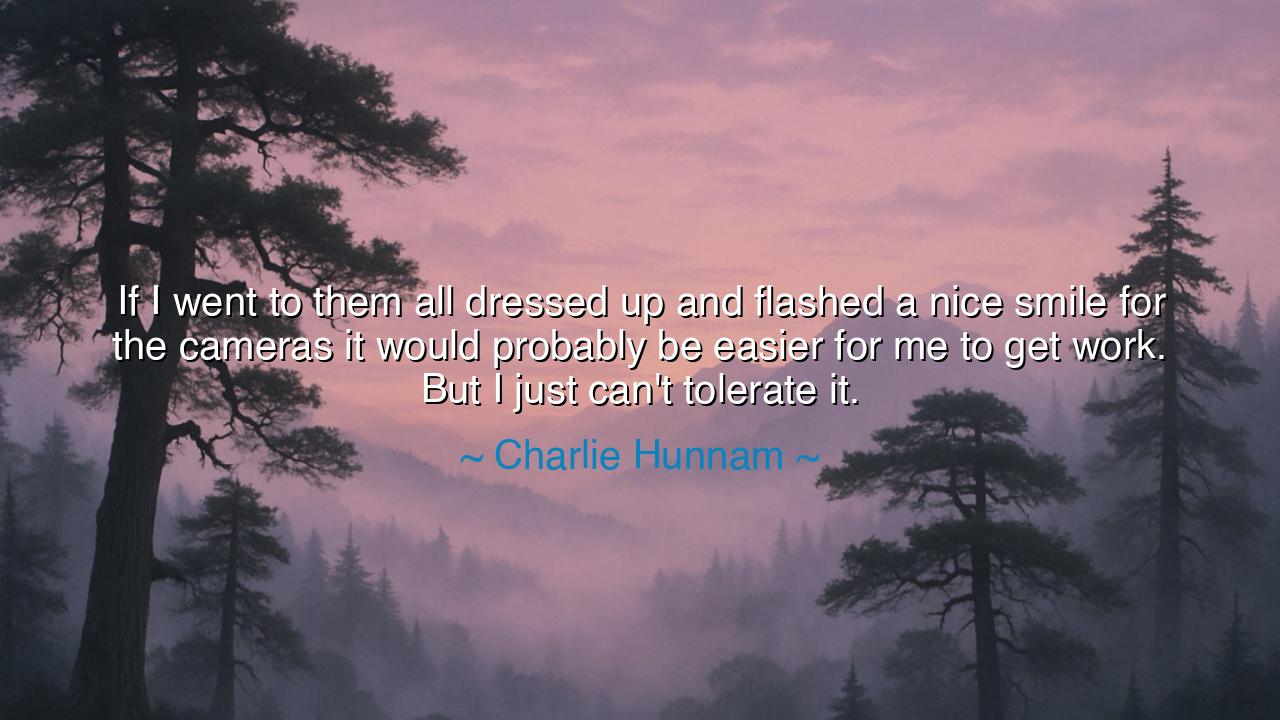
If I went to them all dressed up and flashed a nice smile for the
If I went to them all dressed up and flashed a nice smile for the cameras it would probably be easier for me to get work. But I just can't tolerate it.






In the words of Charlie Hunnam, we encounter not merely a reflection on the craft of acting, but a declaration of principle: “If I went to them all dressed up and flashed a nice smile for the cameras it would probably be easier for me to get work. But I just can't tolerate it.” This statement, plain yet defiant, is a testament to the eternal struggle between appearance and authenticity, between the path of ease and the path of integrity. For what Hunnam rejects is not the camera itself, but the compromise of spirit that comes with sacrificing truth for convenience.
The ancients would say that to smile for the cameras is to don the mask of flattery. It is a ritual of appearances, designed to charm and to persuade without substance. Many choose this way, for it opens doors swiftly, greases the wheels of fortune, and grants them what they seek. But Hunnam speaks as one unwilling to bend his soul for such gain. He declares, “I cannot tolerate it,” and in this refusal, he echoes the old philosophers who taught that a man’s honor is worth more than his comfort, and his integrity greater than his advancement.
Consider the tale of Diogenes, the ancient cynic, who lived in poverty but refused to bow to kings. When Alexander the Great stood before him and offered him anything in the world, Diogenes replied, “Stand out of my sunlight.” He could have courted favor, wealth, or protection with a word, but he would not give up his truth for appearances. In Hunnam’s rejection of the staged smile, we hear the same spirit—a refusal to adorn oneself falsely in order to gain what is fleeting. Both men chose the harder path, but one that preserved the self unbroken.
Yet, Hunnam’s words also reveal the cost of this stance. To refuse the easy smile is to embrace struggle. Work becomes harder to find, recognition more elusive, the journey steeper and slower. The world often rewards those who play the game of appearances, and punishes those who resist it. But history teaches us that such resistance, though costly in the moment, bears the greater reward of freedom. To be true to oneself, even when it delays success, is to build a foundation that cannot crumble.
Look to Abraham Lincoln, who, before his presidency, was often mocked for his rough appearance and awkward manner. He could have polished his image, softened his rough edges, and courted admiration with practiced charm. Yet he remained himself, honest and unvarnished, his strength not in a rehearsed smile but in the integrity of his words and deeds. In time, it was this very authenticity that lifted him above all rivals and gave his leadership the force of truth. Like Hunnam, Lincoln showed that sincerity, though slower to persuade, is more enduring than empty charm.
The lesson here is profound: the world will always tempt you to sacrifice authenticity for advancement. It will whisper that if you only dress up a little, if you only smile a little falsely, doors will open, and rewards will flow. But the ancient wisdom and Hunnam’s defiance both teach us that such gain comes at the cost of the soul. What you win by pretense, you lose in self-respect. What you win by truth, you keep forever, even if it is won with hardship.
So, beloved seeker, take this teaching into your life: do not bow to the tyranny of appearances. Dress with dignity, but never as a disguise. Smile with joy, but never as a lie. Speak and act in ways that reflect your true self, even if it costs you the swift reward. For the path of authenticity is slower, but it leads to a kingdom where your spirit is free, and your victories are your own. Choose the harder road, as Hunnam chose, and though you may toil longer, you will walk in the sunlight of truth, untarnished and unafraid.






AAdministratorAdministrator
Welcome, honored guests. Please leave a comment, we will respond soon